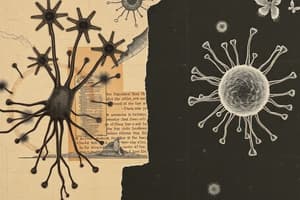Podcast
Questions and Answers
What characterizes autoimmune disorders?
What characterizes autoimmune disorders?
- The body fails to respond to allergies.
- The immune system enhances its response to pathogens.
- The immune system system relies solely on cytokines.
- The immune system mistakenly attacks the body's own tissues. (correct)
How do cytokines function within the immune system?
How do cytokines function within the immune system?
- They directly destroy pathogens through lysis.
- They solely mediate inflammation.
- They eliminate the need for vaccinations.
- They coordinate and regulate the activities of immune cells. (correct)
What is the primary purpose of vaccination?
What is the primary purpose of vaccination?
- To introduce a harmless form of a pathogen to develop immunological memory. (correct)
- To enhance the inflammatory response to pathogens.
- To destroy existing memory cells to strengthen future responses.
- To eliminate all pathogens before they enter the body.
Which of these statements about hypersenitivity reactions is true?
Which of these statements about hypersenitivity reactions is true?
What is a key feature of immunological memory?
What is a key feature of immunological memory?
What type of immunity serves as the body's first line of defense against pathogens?
What type of immunity serves as the body's first line of defense against pathogens?
Which immune cells are known for directly killing infected cells?
Which immune cells are known for directly killing infected cells?
What role do antibodies play in the immune response?
What role do antibodies play in the immune response?
Which of the following cells present antigens to T cells?
Which of the following cells present antigens to T cells?
Which characteristic is unique to adaptive immunity?
Which characteristic is unique to adaptive immunity?
What is a common feature of phagocytic cells like macrophages and neutrophils?
What is a common feature of phagocytic cells like macrophages and neutrophils?
Immunodeficiency disorders are characterized by which of the following?
Immunodeficiency disorders are characterized by which of the following?
What is the main function of natural killer (NK) cells in the immune system?
What is the main function of natural killer (NK) cells in the immune system?
Flashcards
Innate Immunity
Innate Immunity
The body's first line of defense against pathogens. It's rapid and doesn't target specific pathogens.
Adaptive Immunity
Adaptive Immunity
The second line of defense, specifically targeting and remembering pathogens.
Phagocytic Cells
Phagocytic Cells
Cells that engulf and destroy pathogens.
Cytotoxic T Cells
Cytotoxic T Cells
Signup and view all the flashcards
Antibodies
Antibodies
Signup and view all the flashcards
Antigens
Antigens
Signup and view all the flashcards
Antigen Presentation
Antigen Presentation
Signup and view all the flashcards
Immunodeficiency Disorders
Immunodeficiency Disorders
Signup and view all the flashcards
Autoimmune disorders
Autoimmune disorders
Signup and view all the flashcards
Hypersensitivity reactions
Hypersensitivity reactions
Signup and view all the flashcards
Inflammation
Inflammation
Signup and view all the flashcards
Complement system
Complement system
Signup and view all the flashcards
Immunological Memory
Immunological Memory
Signup and view all the flashcards
Study Notes
Overview of Immunity
- Immunity protects the body from harmful pathogens (bacteria, viruses, fungi).
- A coordinated response from many cells and molecules is involved.
- The immune system identifies and eliminates pathogens.
- Immunity is categorized into innate and adaptive.
Innate Immunity
- Innate immunity is the body's initial defense against pathogens.
- It provides a rapid, non-specific response.
- Key components: physical barriers (skin, mucous membranes), phagocytic cells (macrophages, neutrophils), and natural killer (NK) cells.
- Innate responses recognize pathogen patterns, not specific molecules.
Adaptive Immunity
- Adaptive immunity is a specific and effective response to pathogens.
- Specialized cells recognize and target specific pathogens.
- Key components: lymphocytes (T cells, B cells), antibodies.
- Adaptive immunity has memory; faster and stronger responses upon re-exposure.
Key Immune Cells
- Macrophages: Phagocytose pathogens, present antigens to T cells.
- Neutrophils: Phagocytic cells, initial infection response.
- Natural Killer (NK) cells: Kill infected or cancerous cells via cytotoxic granules.
- T cells: Lymphocytes involved in cell-mediated immunity, recognize and kill infected cells or regulate responses.
- Helper T cells (CD4+): Activate other immune cells (B cells, cytotoxic T cells).
- Cytotoxic T cells (CD8+): Directly kill infected cells.
- B cells: Lymphocytes that produce antibodies.
- Antibodies: Bind to pathogen antigens, marking them for destruction.
Antigen Presentation
- Antigens trigger immune responses.
- Cells like macrophages process and present antigens on their surface.
- This allows T cells to recognize and respond to pathogens.
Immune System Disorders
- Immunodeficiency disorders: Weakened or impaired immune system function.
- Autoimmune disorders: Immune system attacks body's own tissues.
- Hypersensitivity reactions: Overreactions to harmless substances, causing allergic responses.
Immune Responses
- Inflammation: Localized response to infection/injury; increased blood flow, swelling, pain; innate and adaptive immune cells involved.
- Complement system: Proteins enhancing immune responses, promoting inflammation and pathogen destruction.
Cytokines
- Cytokines are signaling molecules from immune cells, regulating immune responses.
- They coordinate different immune cell activities.
- Examples: interferons, interleukins, tumor necrosis factor.
Immune System Development
- Immune system develops throughout childhood.
- Exposure to pathogens (and vaccinations) strengthens the immune system.
Immunological Memory
- Adaptive immunity's remarkable feature.
- Past pathogen encounters create faster and more robust responses.
- Basis for vaccination strategies.
Vaccination
- Introduces a harmless pathogen form to stimulate an adaptive response.
- Creates memory cells, developing antibodies for future encounters.
- Prevents infections before symptoms arise.
Studying That Suits You
Use AI to generate personalized quizzes and flashcards to suit your learning preferences.




